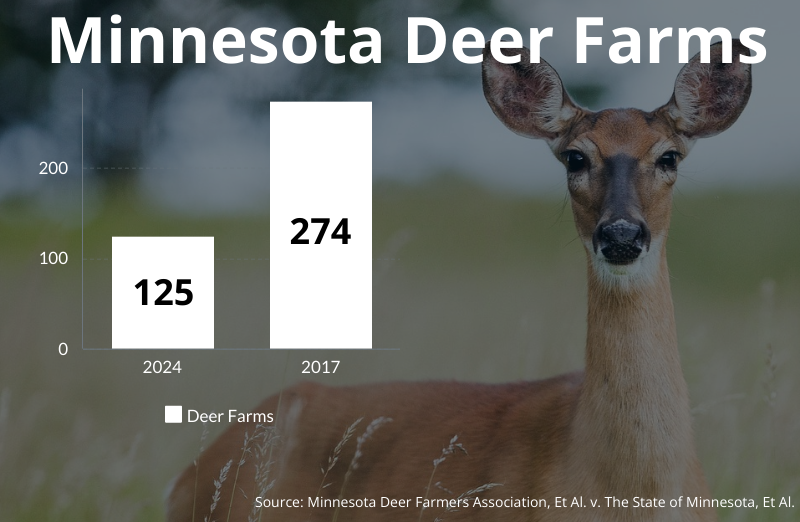Deer farm moratorium draws suit
By: Laura Brown//January 12, 2024//
Minnesota deer farmers are suing the state over a moratorium on new deer farms. In Minnesota Deer Farmers Association, Et Al. v. The State of Minnesota, Et Al., filed Dec. 28, 2023, the plaintiffs seek declaratory and preliminary injunctive relief to enjoin new regulations from enforcement by the Minnesota Department of Natural Resources.
Deer farmers breed deer to sell venison, antlers, or the deer themselves. According to the DNR, there are 3,325 deer in 125 Minnesota farms. This has fallen from 274 deer farms in 2017, according to the lawsuit.
Minnesota deer farms became a target for legislators last session because they were perceived as a hotbed for chronic waste disease (CWD). CWD is a fatal neurological disease caused by self-replicating, abnormal proteins. It spreads from animal to animal through contact with contaminated body fluids or tissue. According to the Centers for Disease Control and Prevention, it is unknown if humans can become infected with CWD.

CWD exists in the wild deer populations in Minnesota, though the 2023 numbers of were relatively low. There are measures in place to help contain CWD, including testing and methods to keep farmed and wild deer separate. There is also annual herd inspection by a certified veterinarian and specific fencing requirements to contain the deer.
Legislation proposed and passed in 2023 took aim at curbing CWD by restricting Minnesota deer farms. No new deer farms can open in the state. Additionally, registration for captive white-tailed deer cannot be transferred except to immediate family members.
The bill was sponsored by Rep. Jamie Becker-Finn, DFL-Roseville, who is a deer hunter. “The idea that deer who are infected with CWD — because of the things we’re not taking care of now — would not be safe for my family to eat. That is my biggest fear,” Becker-Finn said.
But the Minnesota deer farmers— who referred to the legislation as a “nightmare of a bill” — have responded with a lawsuit. Plaintiffs, who are white-tailed deer farmers and members of Minnesota Deer Farmers Association, argue that Minnesota officials cannot directly attribute wild white-tailed deer CWD to farmed deer, so the state law lacks justification. “There is no direct evidence in Minnesota to connect CWD found in wild deer to a farmed white-tailed deer farm or vice versa,” plaintiffs write in the complaint.
They claim that the restrictions “prohibit the Plaintiffs to pursue their profession, occupation, or calling as white-tailed deer farmers.” The plaintiffs refer to the new rules as “efforts to eradicate the profession or occupation of white-tailed deer farmers in Minnesota”
The lawsuit characterizes the restrictions as an unconstitutional taking of private property by the government. The DNR is permitted to seize and destroy illegally possessed farmed deer. Plaintiffs argue that state laws that authorize seizure and destruction of deer livestock based on the restraint on alienation of deer livestock is an “uncompensated taking” under both the federal and state Takings Clause.
The plaintiffs also allege that the state has discriminated against deer farmers who do not have immediate family. While deer owners can do a one-time transfer to a family member, they cannot transfer the deer to nonregistered, nonfamily owners.
Plaintiffs request the court enjoin enforcement, require just compensation, award damages, and award reasonable attorney fees and costs. The plaintiffs have demanded a jury trial.
Legal News
- 70 years after Brown, school integration stymied
- Wisconsin man gets 15 years in prison for Door County bar fire that killed two
- Noncitizen voting, already illegal in federal elections, becomes a centerpiece of 2024 GOP messaging
- Wisconsin election officials fear voter confusion over 2 elections for same congressional seat
- ICC prosecutor seeks arrest warrant for Israeli and Hamas leaders, including Netanyahu
- Up in smoke: Workers remove dozens of apparent marijuana plants from Wisconsin Capitol tulip garden
- The Senate filibuster is a hurdle to any national abortion bill
- Bones found in 1989 in a Wisconsin chimney identified as man who last contacted relatives in 1970
- WisGOP convention spotlights abortion, higher education, immigration and national security
- NAACP: No consequences for UWM Pro-Palestinian protesters shows ‘bias’ and ‘privilege’
- New complaints filed against Northwestern over Kenosha football hazing scandal
- Justice Department submits proposed regulation to reschedule marijuana
WLJ People
- Power 30 Personal Injury Attorneys – Russell Nicolet
- Power 30 Personal Injury Attorneys – Benjamin Nicolet
- Power 30 Personal Injury Attorneys – Dustin T. Woehl
- Power 30 Personal Injury Attorneys – Katherine Metzger
- Power 30 Personal Injury Attorneys – Joseph Ryan
- Power 30 Personal Injury Attorneys – James M. Ryan
- Power 30 Personal Injury Attorneys – Dana Wachs
- Power 30 Personal Injury Attorneys – Mark L. Thomsen
- Power 30 Personal Injury Attorneys – Matthew Lein
- Power 30 Personal Injury Attorneys – Jeffrey A. Pitman
- Power 30 Personal Injury Attorneys – William Pemberton
- Power 30 Personal Injury Attorneys – Howard S. Sicula













